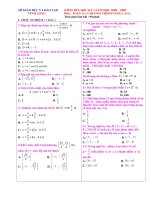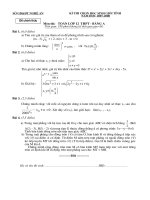A 551 a 551m 08 (2013)
Bạn đang xem bản rút gọn của tài liệu. Xem và tải ngay bản đầy đủ của tài liệu tại đây (85.19 KB, 3 trang )
Designation: A551/A551M − 08 (Reapproved 2013)
Standard Specification for
Carbon Steel Tires for Railway and Rapid Transit
Applications1
This standard is issued under the fixed designation A551/A551M; the number immediately following the designation indicates the year
of original adoption or, in the case of revision, the year of last revision. A number in parentheses indicates the year of last reapproval.
A superscript epsilon (´) indicates an editorial change since the last revision or reapproval.
2. Referenced Documents
1. Scope
1.1 This specification covers seven classes of carbon steel
tires for railway and rapid transit use.
1.1.1 Class A—For untreated driving tires for locomotives
in passenger service.
1.1.2 Class AHT—For heat-treated driving tires for locomotives in passenger service.
1.1.3 Class B—For untreated driving tires for freight locomotives and tires for locomotive-truck, tender-truck, trailer and
car wheels, and miscellaneous service.
1.1.4 Class BHT—For heat-treated driving tires for freight
locomotives and tires for trailer wheels.
1.1.5 Class C—For untreated tires for switching locomotives.
1.1.6 Class CHT—For heat-treated driving tires and switching locomotives and tires for locomotive-trucks, tender-trucks,
trailer and car wheels, and miscellaneous service.
1.1.7 Class DHT—For heat-treated driving tires for locomotives with light braking conditions, heavily loaded trailer tires,
and rapid transit wheels where off-tread brakes are employed.
2.1 ASTM Standards:2
A370 Test Methods and Definitions for Mechanical Testing
of Steel Products
A788/A788M Specification for Steel Forgings, General Requirements
2.2 AAR Standard:
AAR M-107/M-208 Wheels, Carbon Steel3
3. Ordering Information and General Requirements
3.1 Material supplied to this specification shall conform to
the requirements of Specification A788/A788M, which outlines ordering information, manufacturing requirements, testing and retesting methods and procedures, marking,
certification, product analysis variations, and additional supplementary requirements.
3.1.1 If the requirements of this specification are in conflict
with those of Specification A788/A788M, then the requirements of this specification shall prevail.
1.2 Supplementary requirements, including those in the
general requirements of Specification A788/A788M, are provided for use when additional testing or inspection is desired.
These shall apply only when specified individually by the
purchaser in the order.
3.2 In addition to the ordering requirements from Specification A788/A788M, the following details should be supplied:
3.2.1 Full identification of tread and flange contour with
dimensional drawings as required,
3.2.2 Inside diameter to be rough machined or finished,
3.2.3 Intended service, and
3.2.4 Chemical composition requirements, if different from
those given in Table 1.
1.3 The values stated in either SI units or inch-pound units
are to be regarded separately as standard. Within the text and
tables the SI units are shown in brackets. The values stated in
each system may not be exact equivalents; therefore each
system shall be used independently of the other. Combining
values from the two systems may result in nonconformance
with the standard.
4. Chemical Requirements
4.1 Chemical Composition—The steel shall conform to the
requirements for chemical composition specified in Table 1,
unless otherwise required by the purchaser (see 3.2.4).
1.4 Unless the order specifies the applicable “M” specification designation, the tires shall be furnished to the inch-pound
units.
1
This specification is under the jurisdiction of ASTM Committee A01 on Steel,
Stainless Steel and Related Alloys and is the direct responsibility of Subcommittee
A01.06 on Steel Forgings and Billets.
Current edition approved April 1, 2013. Published April 2013. Originally
approved in 1965 to replace Specifications A26 and A329. Last previous edition
approved in 2008 as A551/A551M – 08. DOI: 10.1520/A0551_A0551M-08R13.
2
For referenced ASTM standards, visit the ASTM website, www.astm.org, or
contact ASTM Customer Service at For Annual Book of ASTM
Standards volume information, refer to the standard’s Document Summary page on
the ASTM website.
3
Available from Association of American Railroads (AAR), 425 Third St., SW,
Washington, DC 20024, .
Copyright © ASTM International, 100 Barr Harbor Drive, PO Box C700, West Conshohocken, PA 19428-2959. United States
1
A551/A551M − 08 (2013)
TABLE 1 Chemical Requirements
Element wt %
Classes A and AHT
Classes B and BHT
Classes C, CHT, and DHT
Carbon
Manganese
Phosphorous, max
Sulfur
Silicon
Nickel, maxA
Chromium, maxA
Molybdenum, maxA
Vanadium, maxA
Copper, max
Aluminum, max
Titanium, max
Columbium, max (Niobium)
0.50 – 0.65
0.60 – 0.90
0.030
0.005 – 0.040
0.15 – 1.00
0.25
0.25
0.10
0.040
0.35
0.060
0.03
0.05
0.60 – 0.75
0.60 – 0.90
0.030
0.005 – 0.040
0.15 – 1.00
0.25
0.25
0.10
0.040
0.35
0.060
0.03
0.05
0.70 – 0.85
0.60 – 0.90
0.030
0.005 – 0.040
0.15 – 1.00
0.25
0.25
0.10
0.040
0.35
0.060
0.03
0.05
A
The manufacturer may exceed the noted maximum limits for nickel, chromium, molybdenum, or vanadium provided that the following relationship (AAR M-107/M-208)
is met:
930 2 f 570 3 %C g 2 f 80 3 %Mng 2 f 20 3 %Sig 2 f 50 3 %Crg 2 f 30 3 %Nig 2 f 20 3 s % Mo1%V d g .390
for individual hardness measurement. Those meeting the hardness requirements of 6.1.1 shall be accepted.
4.1.1 The purchaser may use the product analysis provisions
of Specification A788/A788M for tires produced to the requirements of Table 1. By agreement with the manufacturer, these
provisions may be used also when the provisions of 3.2.4
apply.
7. Reheat Treatment
5. Manufacture
7.1 The heat treatment of any tires failing to meet the
specified hardness may be repeated in accordance with 5.3.1
and retested in accordance with Section 6.
5.1 Discard—Sufficient discard shall be made from each
ingot to assure freedom from piping and undue segregation.
8. Mating
8.1 The tires shall be grouped according to outside diameter
and shipped in sets.
5.2 Post Forge Cooling—All tires, immediately after being
rolled, shall be slow cooled in a manner to accomplish proper
transformation without damage.
8.2 The variation in outside diameters in each set shall not
exceed 1⁄16 in. [1.5 mm] for tires 33 in. [825 mm] or under in
outside diameter, nor exceed 3⁄32 in. [2.5 mm] for tires over 33
in. [825 mm] in outside diameter.
5.3 Heat Treatment:
5.3.1 Classes AHT, BHT, CHT, and DHT shall be heated to
and held at the proper temperature for a sufficient time to effect
the desired transformation and then shall be immersed in a
suitable quenching medium.
5.3.2 Following quenching, the tires shall be charged into a
furnace for tempering to meet the hardness requirements of
6.1.1, and then cooled under suitable conditions.
9. Permissible Variations in Dimensions
9.1 Tires may be furnished with all surfaces as-rolled, and
shall conform to the dimensions specified. When not specified,
the following tolerances are acceptable:
9.1.1 Height of Flange—The flange height shall not be less,
but may be 1⁄16 in. [1.5 mm] more, than that specified.
9.1.2 Thickness of Flange—The flange thickness shall not
vary more than 1⁄16 in. [1.5 mm] from that specified.
9.1.3 Radius of Throat—The throat radius shall not vary
more than 1⁄8 in. [3 mm] over, nor more than 1⁄16 in. [1.5 mm]
under, that specified.
9.1.4 Width of Tires—The tire width may be 3⁄16 in. [4.8 mm]
more than that specified.
9.1.5 Inside Diameter—For shrink fit tires, the rough inside
diameter shall not be more, but may be 1⁄4 in. [6 mm] less, than
that specified. When the finished inside diameter only is
specified, the rough diameter shall be from 3⁄16 to 7⁄16 in. [5 to
11 mm] less than this diameter.
9.1.6 Outside Diameter—Unless otherwise specified for
shrink fit tires, the outside diameter, when 54 in. [1350 mm] or
under, shall not be less, but may be 1⁄2 in. [12.5 mm] more than
that specified; and when over 54 in. [1350 mm], shall not vary
more than 1⁄8 in. [3 mm] under, nor more than 3⁄8 in. [10 mm]
over that specified.
6. Hardness Requirement
6.1 Classes AHT, BHT, CHT, and DHT shall be accepted on
the basis of a Brinell hardness test on the front face of 10 % of
the tires from each heat at a location approximately 1 in. [25
mm] below the tread.
6.1.1 The tires shall conform to the following limits:
Class
Brinell
hardness
AHT
BHT
CHT
DHT
223 to
277
255 to
302
285 to
331
321 to
363
6.1.2 Where continuous heat-treating furnaces are used,
should any of the tested tires fail to meet the hardness
requirements of 6.1.1, the manufacturer may offer for individual hardness measurements, all of the tires of that heat in the
lot for inspection. Those meeting the hardness requirements of
6.1.1 shall be accepted.
6.1.3 Where batch heat-treating furnaces are used, should
any of the tires fail to meet the requirements of 6.1.1, the
manufacturer may offer all of the tires in the heat treatment lot
2
A551/A551M − 08 (2013)
serial number, heat number, date of manufacture, and class
shall be legibly stamped on each tire close to the inside edge
where they will not be removed by the last turning.
9.1.7 Rotundity—Tires shall not be out-of-round more than
⁄ in. [1.5 mm] for tires 33 in. [825 mm] or under in outside
diameter, nor more than 3⁄32 in. [2.5 mm] for tires over 33 in.
[825 mm] in outside diameter.
1 16
11. Keywords
10. Marking
11.1 forged wheel tires; locomotive tires; rail applications;
rail car tires
10.1 In addition to the marking requirements of Specification A788/A788M, the name of the manufacturer or brand, the
SUPPLEMENTARY REQUIREMENTS
S2.2 The tension test, done in accordance with Test Methods
and Definitions A370, shall conform to the requirements of
Table S2.1.
S1. Incidental Alloying Elements
S1.1 Incidental elements for the grades specified in Table 1
shall not exceed the limits shown in Table S1.1.
TABLE S1.1 Incidental Alloying Elements
Element
TABLE S2.1 Tension Tests
Composition, max, %
Chromium
Nickel
Molybdenum
Class
0.15
0.25
0.06
AHT
BHT
CHT
DHT
S1.2 The values determined for the elements listed in Table
S1.1 shall be reported with the heat analysis.
S2. Classes AHT, BHT, CHT, and DHT
ksi
MPa
Elongation in
2 in. or 50
mm, min, %
110
125
140
155
760
860
965
1070
16.0
14.0
12.0
10.0
Tensile Strength, min
Reduction of
Area, min, %
32.0
28.0
24.0
20.0
S2.3 The tension test specimen shall be taken from the
position indicated in Fig. S2.1.
S2.1 In addition to hardness testing, one tension test shall be
made from one tire per heat, per heat treatment charge.
FIG. S2.1 Location in Tire of Tension Test Specimen
ASTM International takes no position respecting the validity of any patent rights asserted in connection with any item mentioned in
this standard. Users of this standard are expressly advised that determination of the validity of any such patent rights, and the risk
of infringement of such rights, are entirely their own responsibility.
This standard is subject to revision at any time by the responsible technical committee and must be reviewed every five years and
if not revised, either reapproved or withdrawn. Your comments are invited either for revision of this standard or for additional standards
and should be addressed to ASTM International Headquarters. Your comments will receive careful consideration at a meeting of the
responsible technical committee, which you may attend. If you feel that your comments have not received a fair hearing you should
make your views known to the ASTM Committee on Standards, at the address shown below.
This standard is copyrighted by ASTM International, 100 Barr Harbor Drive, PO Box C700, West Conshohocken, PA 19428-2959,
United States. Individual reprints (single or multiple copies) of this standard may be obtained by contacting ASTM at the above
address or at 610-832-9585 (phone), 610-832-9555 (fax), or (e-mail); or through the ASTM website
(www.astm.org). Permission rights to photocopy the standard may also be secured from the ASTM website (www.astm.org/
COPYRIGHT/).
3









